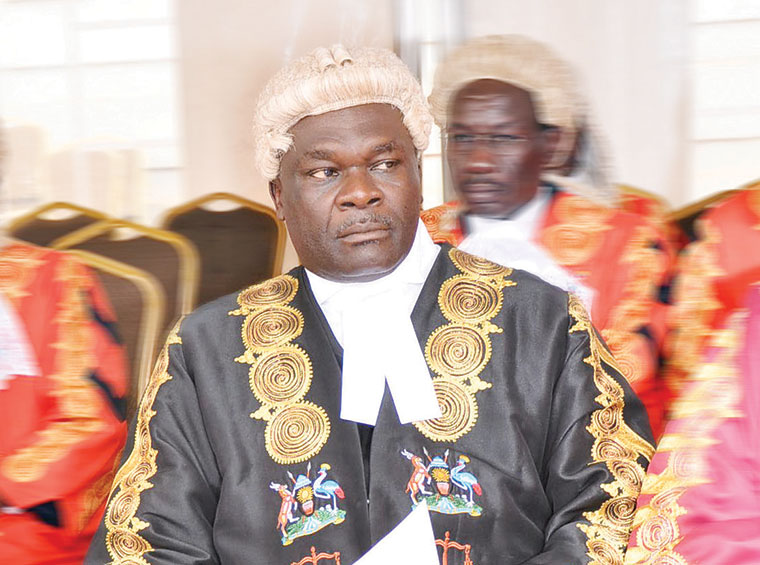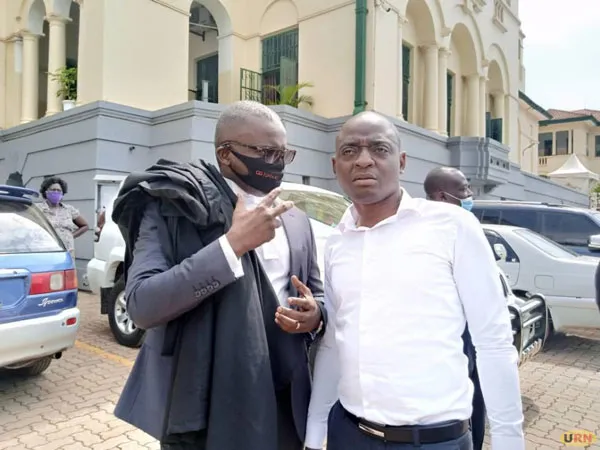Uganda’s Supreme Court, Uganda’s highest court has dismissed attempts by businessman Hamis Kiggundu to run away from his debt obligations with Diamond Trust Bank Uganda (DTB-U) and Diamond Trust Bank Kenya (DTB-K), using the cover that the syndicated lending to him was done without a license and therefore an illegality and a nullity.
Dismissing the application by Hamis Kiggundu and his companies, Ham Enterprises Ltd and Kiggs International Ltd), the Coram of 5 judges⏤Owiny-Dollo CJ; Mwondha JSC; Tuhaise JSC; Chibita JSC; Musota JSC)⏤ in a lead judgment by the Chief Justice, the Hon. Owiny-Dollo further re-emphasised no law forbids the creation of the syndicated agency relationship such as the kind entered by DTB-U and DTB-K.
The 5 justices further reaffirmed that syndicated lending transactions between foreign banking/non-banking institutions and Ugandans are legal and that it is not illegal for foreign financial institutions to extend credit facilities to any financial institution or person in Uganda and such credit agreements are legal and enforceable.
The Supreme Court proceeded to uphold an earlier Court of Appeal finding that the High Court awards to Ham were without legal basis (i.e. payment to Ham in the sums of UGX34,295,951,553 and USD23,467,670.61; the order releasing Hams properties and all guarantees issued to secure his borrowing from DTB; and orders to the effect the DTB-U loan in the sum of USD6,974,600 and DTB-K loan of USD4,014,444 should not be repaid by Ham).
Having conclusively pronounced itself on the matter of illegality, the Supreme Court then ordered that High Court Civil Suit No. 43 of 2020, between the parties, which was the genesis of the appeal to the Court of Appeal, and ultimately to the Supreme Court, is remitted back to the High Court for trial before another judge; basing only on issues of fact.
Background and facts to the case
Hamis Kiggundu and his companies (Ham Enterprises Ltd and Kiggs International Ltd) took credit facilities from DTB Uganda (DTB-U) and DTB Kenya (DTB-K) which Ham failed to pay back. As a result, DTB commenced a recovery process for the money in early 2020. At this point, DTB-U was owed USD 4,014,444 while DTB-K was owed USD 6,974,600.
In response Ham filed Civil Suit No 43 of 2020 in the High Court against the DTB claiming unfair contractual terms and illegal deductions from his accounts. Ham also sought an order directing a full account reconciliation of all financial transactions between the parties.

DTB-U and DTB-K filed a joint defence denying the allegations and contending that Ham was indebted to both of them in the sum of USD 4,014,444 and USD6,974,600 respectively. DTB conceded to the full account reconciliation as requested by Ham.
On 10th August 2020, Ham amended his claim and introduced an entirely new claim that the loan agreements were illegal and unenforceable. Ham now asked the court for the following orders:
- a declaration that the credit facilities offered by DTB were irregular, illegal, null, void and unenforceable.
- a declaration that DTB’s demand for repayment of USD4,014,444 and USD6,974,600 is illegal and unenforceable;
- an order for DTB-K and DTB-K to instead pay Ham UGX. 34,295,951,553/= and USD23,467,670.61 as money that he said was unlawfully deducted from Ham’s accounts;
- the unconditional removal of mortgages on Ham’s properties and the discharge of all corporate and personal guarantees issued to secure Ham’s borrowings.
Ham then filed an application Miscellaneous Application No 654 of 2020 on 28th August 2020 asking the court to strike out the joint defence of DTB-U and DTB-K on the grounds that DTB-K illegally conducted financial institutions’ business in contravention of the Financial Institutions Act (2004). On 31st August 2020, DTB and Ham appeared before Justice Henry Peter Adonyo when it was agreed by the parties that a court-appointed auditor would be required to carry out an audit and reconciliation of the loan amounts. The court then ordered that an independent auditor be appointed by the Institute of Certified Public Accountants of Uganda.
On 17th September 2020, Ham changed strategy and instead filed Miscellaneous Application No 729 of 2020 to stop the appointment of an auditor, which Justice Adonyo surprisingly allowed. The appointment of the auditor was therefore stopped by the court.
On 7th October 2020, Justice Adonyo then struck out the joint DTB Defence on the ground that it was a perpetuation of illegal lending and proceeded to determine the whole case without hearing any witnesses or examination of documents. He ordered that:
- Credit facilities taken by Ham from DTB-K in the sum of USD6,974,600 are illegal;
- By their illegal lending, DTB-K with the help of DTB-U had breached the law and therefore the credit facilities taken by Ham from DTB-K in the sum of USD6,974,600 should not be repaid; DTB-U was also to forfeit USD4,014,444 that it had lent to Ham.
- DTB-U and DTB-K were ordered to pay Ham the sums of UGX. 34,295,951,553/= and USD23,467,670.61 being money Ham alleged was unlawfully appropriated from his accounts;
- Ham’s properties and all corporate and personal guarantees issued to secure his borrowings were to be released.
DTB being dissatisfied with the ruling of Justice Adonyo, filed an appeal Civil Appeal No 242 of 2021 in the Court of Appeal against the decision. On 5th May 2021, the Court of Appeal delivered its judgment, setting aside the orders of Justice Adonyo and ordered that the matter be sent back to the High Court for hearing before another judge.

Ham appealed this judgement to the Supreme Court⏤ Ham Enterprises Ltd, Kiggs International (U) Ltd, Hamis Kiggundu vs Diamond Trust Bank (U) Ltd and Diamond Trust Bank 9K) Ltd (Supreme Court Civil Appeal No. 13 of 2021).
Supreme Court findings and ruling in detail
The Coram of 5 Supreme Court justices in a lead judgement by the Chief Justice, the Hon. Owiny-Dollo found out and decreed that:
- The trial judge, Justice Adonyo erred in law in finding that the credit transactions were illegal. In any event, he ought to have accorded DTB-K and DTB-U a hearing to establish the parties’ contributory liability and determine the fate of the monies advanced under the illegal credit facilities, and not summarily as he did.
- The trial judge, Justice Adonyo, had ordered for the audit of the transactions and ascertainment of the status of the loans between the parties; hence, he was under a duty to determine the aspects of the dispute between the Ham and the DTB-U, arising from the loan the DTB-U had extended to Ham, and over which the issue of illegality had not arisen. He, however, failed to do so; and he instead made an omnibus finding of the illegality of all the transactions. His failure to conduct a trial in the main suit offended the age-old cardinal rule that no one should be condemned without being accorded the right to be heard on the matter in controversy.
- It is incumbent on a superior court before which any question or issue strictly of law is raised, to exercise prudence and pronounce itself thereon; instead of referring the question of law back to a lower or inferior Court for determination. This owes to the fact that the Superior Court has the overriding competence to make an authoritative and binding decision on the matter. The Court of Appeal ought to have determined the issue of the legality of the credit facilities and erred in failing to do so.
- The determination of whether one is carrying out a financial institution business lies in establishing whether one is “lending or extending money held on deposit or any part of that money …”. It is unmistakably clear from the amendment of the Financial Institutions Act that the key to the determination of financial institution business is the holding of money on deposit; from which money is extended or lent out to borrowers. DTB Kenya is not a deposit-taking institution and did not lend money held on deposit in Uganda.
- It is clear from the credit facility agreements between the parties that the DTB-K did not extend the said credit facilities directly to Ham; but, instead, through DTB-U, which was its appointed agent strictly for purposes of disbursing the credit facilities to, and ensuring recovery from Ham.
- DTB-K is not the type of principal bank envisaged under the 2017 agent banking Regulations, since it is not licensed to carry out financial institution business in Uganda. Similarly, DTB-U is not the type of agent envisaged under the agent banking Regulations; which only provide for humans operating outlets as agents of financial institutions licensed to carry out banking services.
- Accordingly then, the relationship between these two banking institutions (DTB-U and DTB-K), and between them and Ham, with regard to the financial credit transactions, were neither governed by the Financial Institutions Act, 2004, as amended nor the Financial Institutions (Agent Banking) Regulations, 2017, made thereunder. This was a syndicated agency relationship between DTB-U and DTB-K.
- There is no law that forbids the creation of the syndicated agency relationship entered by DTB-U and DTB-K. Similarly, no law was brought to the court’s attention that forbids foreign financial institutions from extending credit facilities to any financial institution or person in Uganda. If anything, in furtherance of international trade and investment, financial institutions the world over are known to engage in global financial business transactions by dealing with, or through, financial institutions based in other jurisdictions. In the case of Uganda, such international financial business transactions are certainly neither governed by the Financial Institutions Act, 2004, as amended, nor the Financial Institutions (Agent Banking) Regulations, 2017, made pursuant thereto. The trial judge, therefore, erred in holding that the credit agreements between the parties hereto were clothed with illegality.
- The issue of illegality having been conclusively resolved in this appeal, High Court Civil Suit No. 43 of 2020, between the parties, which was the genesis of the appeal to the Court of Appeal, and ultimately to this Court, is remitted back to the High Court for trial before another judge; basing only on issues of fact.
- The awards to Ham in the sums of UGX. 34,295,951,553/= and USD23,467,670.61 are vacated.
- The order releasing Ham’s properties and all corporate and personal guarantees issued to secure his borrowings from DTB is vacated.
- The order to the effect that the DTB-K loan in the sum of USD6,974,600 and the DTB-U loan of USD4,014,444, should not be repaid by Ham is vacated.
The issue of illegality having been conclusively resolved in this appeal, the Supreme Court has ordered that High Court Civil Suit No. 43 of 2020, between the parties, which was the genesis of the appeal to the Court of Appeal, and ultimately to this Court, is remitted back to the High Court for trial before another judge; basing only on issues of fact.
At the centre of the High Court case will now be how much Ham owes the two banks and a court-sanctioned audit that Kiggundu has been avoiding to prove if indeed it is true that the banks illegally deducted UGX120 billion from his accounts.
